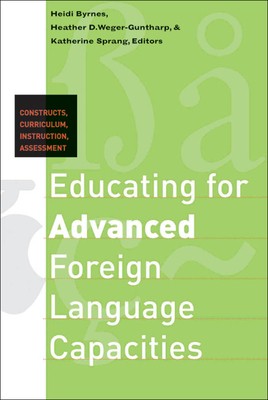
- We will send in 10–14 business days.
- Publisher: Georgetown University Press
- ISBN-10: 158901118X
- ISBN-13: 9781589011182
- Format: 16.1 x 22.7 x 1.5 cm, softcover
- Language: English
- SAVE -10% with code: EXTRA
Educating for Advanced Foreign Language Capacities (e-book) (used book) | bookbook.eu
Reviews
Description
Advanced language learning has only recently begun to capture the interest and attention of applied linguists and professionals in language education in the United States. In this breakthrough volume, experts in the field lay the groundwork for approaching the increasingly important role of advanced language learning in the larger context of multilingual societies, globalization, and security.
This volume presents both general and theoretical insights and language-specific considerations in college classrooms spanning a range of languages, from the commonly taught languages of English, French, and German to the less commonly taught Farsi, Korean, Norwegian, and Russian.
Among theoretical frameworks likely to be conducive to imagining and fostering instructed "advancedness" in a second language, this volume highlights a cognitive-semantic approach. The theoretical and data-based findings make clear that advanced learners in particular are characterized by the capacity to make situated choices from across the entire language system, from vocabulary and grammar to discourse features, which suggests the need for a text-oriented, meaning-driven approach to language teaching, learning, and research.
This volume also considers whether and how information structuring in second-language composition reveals first-language preferences of grammaticized concepts. Other topics include curricular and instructional approaches to narrativity, vocabulary expansion, the demands on instructed programs for efficiency and effectiveness in order to assure advanced levels, and learners' ability to function in professional contexts with their diverse oral and written genre requirements. Finally, the volume probes the role and nature of assessment as a measurement tool for both researching and assessing advanced language learning and as an essential component of improving programs.
EXTRA 10 % discount with code: EXTRA
The promotion ends in 18d.22:05:41
The discount code is valid when purchasing from 10 €. Discounts do not stack.
- Publisher: Georgetown University Press
- ISBN-10: 158901118X
- ISBN-13: 9781589011182
- Format: 16.1 x 22.7 x 1.5 cm, softcover
- Language: English English
Advanced language learning has only recently begun to capture the interest and attention of applied linguists and professionals in language education in the United States. In this breakthrough volume, experts in the field lay the groundwork for approaching the increasingly important role of advanced language learning in the larger context of multilingual societies, globalization, and security.
This volume presents both general and theoretical insights and language-specific considerations in college classrooms spanning a range of languages, from the commonly taught languages of English, French, and German to the less commonly taught Farsi, Korean, Norwegian, and Russian.
Among theoretical frameworks likely to be conducive to imagining and fostering instructed "advancedness" in a second language, this volume highlights a cognitive-semantic approach. The theoretical and data-based findings make clear that advanced learners in particular are characterized by the capacity to make situated choices from across the entire language system, from vocabulary and grammar to discourse features, which suggests the need for a text-oriented, meaning-driven approach to language teaching, learning, and research.
This volume also considers whether and how information structuring in second-language composition reveals first-language preferences of grammaticized concepts. Other topics include curricular and instructional approaches to narrativity, vocabulary expansion, the demands on instructed programs for efficiency and effectiveness in order to assure advanced levels, and learners' ability to function in professional contexts with their diverse oral and written genre requirements. Finally, the volume probes the role and nature of assessment as a measurement tool for both researching and assessing advanced language learning and as an essential component of improving programs.


Reviews